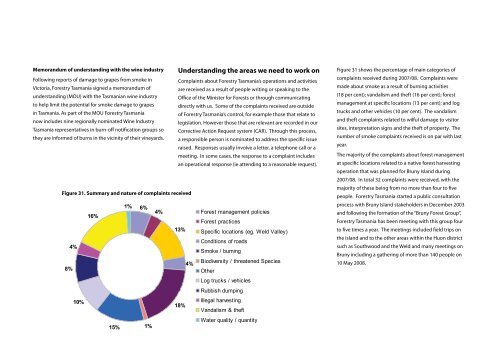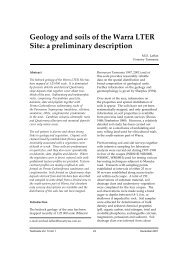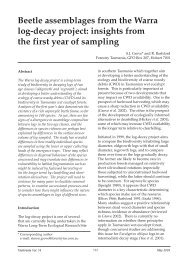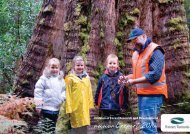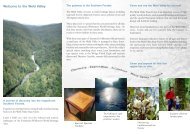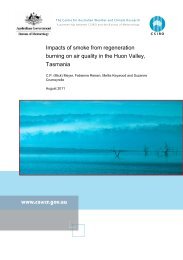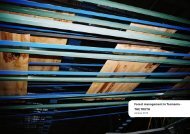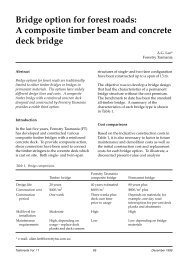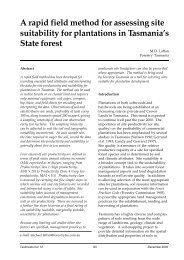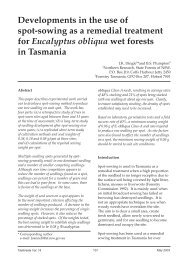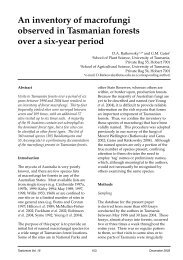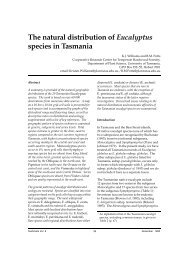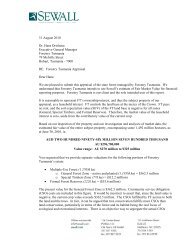sustainable forest management - Forestry Tasmania
sustainable forest management - Forestry Tasmania
sustainable forest management - Forestry Tasmania
Create successful ePaper yourself
Turn your PDF publications into a flip-book with our unique Google optimized e-Paper software.
Memorandum of understanding with the wine industry<br />
Following reports of damage to grapes from smoke in<br />
Victoria, <strong>Forestry</strong> <strong>Tasmania</strong> signed a memorandum of<br />
understanding (MOU) with the <strong>Tasmania</strong>n wine industry<br />
to help limit the potential for smoke damage to grapes<br />
in <strong>Tasmania</strong>. As part of the MOU <strong>Forestry</strong> <strong>Tasmania</strong><br />
now includes nine regionally nominated Wine Industry<br />
<strong>Tasmania</strong> representatives in burn-off notification groups so<br />
they are informed of burns in the vicinity of their vineyards.<br />
Understanding the areas we need to work on<br />
Complaints about <strong>Forestry</strong> <strong>Tasmania</strong>’s operations and activities<br />
are received as a result of people writing or speaking to the<br />
Office of the Minister for Forests or through communicating<br />
directly with us. Some of the complaints received are outside<br />
of <strong>Forestry</strong> <strong>Tasmania</strong>’s control, for example those that relate to<br />
legislation. However those that are relevant are recorded in our<br />
Corrective Action Request system (CAR). Through this process,<br />
a responsible person is nominated to address the specific issue<br />
raised. Responses usually involve a letter, a telephone call or a<br />
meeting. In some cases, the response to a complaint includes<br />
an operational response (ie attending to a reasonable request).<br />
Figure 31. Summary and nature of complaints received<br />
1% 6% 4% Forest <strong>management</strong> policies<br />
16%<br />
Forest practices<br />
13% Specific locations (eg. Weld Valley)<br />
Conditions of roads<br />
4%<br />
Smoke / burning<br />
4%<br />
Biodiversity / threatened Species<br />
8%<br />
Other<br />
Log trucks / vehicles<br />
Rubbish dumping<br />
10%<br />
Illegal harvesting<br />
18%<br />
Vandalism & theft<br />
Water quality / quantity<br />
15% 1%<br />
Figure 31 shows the percentage of main categories of<br />
complaints received during 2007/08. Complaints were<br />
made about smoke as a result of burning activities<br />
(18 per cent); vandalism and theft (16 per cent); <strong>forest</strong><br />
<strong>management</strong> at specific locations (13 per cent); and log<br />
trucks and other vehicles (10 per cent). The vandalism<br />
and theft complaints related to wilful damage to visitor<br />
sites, interpretation signs and the theft of property. The<br />
number of smoke complaints received is on par with last<br />
year.<br />
The majority of the complaints about <strong>forest</strong> <strong>management</strong><br />
at specific locations related to a native <strong>forest</strong> harvesting<br />
operation that was planned for Bruny Island during<br />
2007/08. In total 32 complaints were received, with the<br />
majority of these being from no more than four to five<br />
people. <strong>Forestry</strong> <strong>Tasmania</strong> started a public consultation<br />
process with Bruny Island stakeholders in December 2003<br />
and following the formation of the “Bruny Forest Group”,<br />
<strong>Forestry</strong> <strong>Tasmania</strong> has been meeting with this group four<br />
to five times a year. The meetings included field trips on<br />
the island and to the other areas within the Huon district<br />
such as Southwood and the Weld and many meetings on<br />
Bruny including a gathering of more than 140 people on<br />
10 May 2008.


